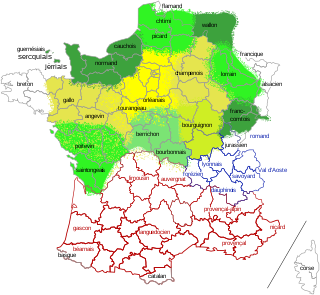
Back Pikardies AF Pikardische Sprache ALS Idioma picardo AN لغة بيكارد Arabic لغه بيكارد ARZ Picardu AST Pikard dili AZ Pėkardu kalba BAT-SMG Пікардская мова BE Пикардски език Bulgarian
| Picard | |
|---|---|
| picard | |
| Pronunciation | [pikaʁ] |
| Native to | France, Belgium |
Native speakers | 700,000 (2011)[1] |
Early forms | |
| Official status | |
Recognised minority language in | |
| Language codes | |
| ISO 639-3 | pcd |
| Glottolog | pica1241 |
| ELP | Picard |
| Linguasphere | 51-AAA-he |
 The geographical spread of Picard and Chtimi among the Oïl languages (other than French) can be seen in shades of green and yellow on this map. | |
 Picard is classified as Vulnerable by the UNESCO Atlas of the World's Languages in Danger [3] | |
Picard (/ˈpɪkɑːrd/,[4] also US: /pɪˈkɑːrd, ˈpɪkərd/,[5][6] French: [pikaʁ] ) is a langue d'oïl of the Romance language family spoken in the northernmost of France and parts of Hainaut province in Belgium. Administratively, this area is divided between the French Hauts-de-France region and the Belgian Wallonia along the border between both countries due to its traditional core being the districts of Tournai and Mons (Walloon Picardy).
The language or dialect is referred to by different names, as residents of Picardy call it simply Picard, but in the more populated region of Nord-Pas-de-Calais it is called Ch'ti or Ch'timi (sometimes written as Chti or Chtimi). This is the area that makes up Romance Flanders, around the metropolis of Lille and Douai, and northeast Artois around Béthune and Lens. Picard is also named Rouchi around Valenciennes, Roubaignot around Roubaix, or simply patois in general French.
In 1998, Picard native speakers amounted to 700,000 individuals, the vast majority of whom were elderly people (aged 65 and over).[7] Since its daily use had drastically declined, Picard was declared by the United Nations Educational, Scientific, and Cultural Organisation (UNESCO) a "severely endangered language".[8] However, as of 2023, the Picard language was listed as “vulnerable” by UNESCO.[9]
- ^ Picard at Ethnologue (25th ed., 2022)

- ^ Hammarström, Harald; Forkel, Robert; Haspelmath, Martin; Bank, Sebastian (24 May 2022). "Oil". Glottolog. Max Planck Institute for Evolutionary Anthropology. Archived from the original on 8 October 2022. Retrieved 7 October 2022.
- ^ "World Atlas of Languages: Picard". en.wal.unesco.org. Retrieved 15 November 2023.
- ^ "Picard". Lexico UK English Dictionary. Oxford University Press. Archived from the original on 22 March 2020.
- ^ "Picard". The American Heritage Dictionary of the English Language (5th ed.). HarperCollins. Retrieved 29 June 2019.
- ^ "Picard". Merriam-Webster.com Dictionary. Merriam-Webster. Retrieved 29 June 2019.
- ^ Auger, Julie (14–17 February 2003). Issues of authenticity, purity, and autonomy in minority languages: What is 'real' Picard, and who is an 'authentic' speaker?. Congress Minority and Diasporic Languages of Europe. Berkeley, US: Indiana University. in Nowak, Pawel; Yoquelet, Corey (eds.). Berkeley Linguistics Society (BLS 29).
* - in France: c. 500 000 speakers [fr] [1]
- in Belgium: a rough approximation is about 12% to 15% of people in province of Hainaut, i.e. c. 150 000 to 200 000 speakers. - ^ OHCHR rapporteurs (20 July 1998). "'According to the UN, about 500,000 speakers in France and 200,000 in Belgium' [archive], Selon l'ONU, environ 500 000 locuteurs en France et 200 000 en Belgique". UNESCO.
- ^ "World Atlas of Languages: Picard". en.wal.unesco.org. Retrieved 15 November 2023.